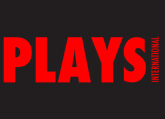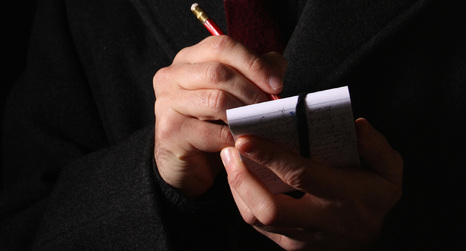
PLAYS INTERNATIONAL – Jeremy Malies
They say only organists go to organ concerts. Whether the audience members who packed Brighton’s Old Courtroom for a bio-drama about an obscure American communist who collaborated with Joseph McCarthy in the 1950s were all US politics junkies I don’t know. But it was manifest from comments as they streamed contentedly out of The Trials of Harvey Matusow that Robert Cohen had turned what on paper appeared a potentially stodgy history lesson into an engrossing retrospective monologue.
This reviewer came to the show with baggage; he is an American politics junkie. But judged on any criteria, be it stagecraft in sustaining the narrative for 90 minutes, psychological insight, shrewd choice of venue that immediately invited debate on culpability or deft creation of an authentic period musk, this was the best one-hander I have seen all year.
Written by Cohen himself and directed by Ralf Higgins, the piece is divided into nine digestible scenes with Matusow first appearing on a freighter crossing the Mersey Estuary in 1966 for a period of exile in England. The sections may have developed in associative leaps but the play was never a stream of consciousness; Cohen's character engaged with the audience and used its responses to find his tempo.
The performer managed to make a perjurer and quisling likeable while inviting us to judge him, perhaps with the proviso that one man's loose cannon is another man’s freedom fighter. Background detail emphasised the point that McCarthyism as a mindset came to prominence long before the politician himself. The piece stems from exhaustive research in an archive at the University of Sussex which Cohen has filtered as if looking for plankton, preserving the telling details and so absorbing us in the period’s political paranoia.
The play took us up to December 1973 with the Watergate burglary convictions only a month away. In flashback we have seen Matusow descend from youthful leftish idealism to a Faustian pact with the FBI and despair at being beyond redemption after a career based on breaking other people.
As we left he was about to watch Charlton Heston in The Ten Commandments with a group of prostitutes for company. The irony here for the author of memoirs entitled False Witness is not lost on Matusow who is above all endearing for his openness. Cohen and Higgins have created one of the highlights of the Brighton Festival Fringe.
At time of writing the piece is being performed in Belgium. It richly deserves a transfer elsewhere in the UK and would flourish in Edinburgh.
They say only organists go to organ concerts. Whether the audience members who packed Brighton’s Old Courtroom for a bio-drama about an obscure American communist who collaborated with Joseph McCarthy in the 1950s were all US politics junkies I don’t know. But it was manifest from comments as they streamed contentedly out of The Trials of Harvey Matusow that Robert Cohen had turned what on paper appeared a potentially stodgy history lesson into an engrossing retrospective monologue.
This reviewer came to the show with baggage; he is an American politics junkie. But judged on any criteria, be it stagecraft in sustaining the narrative for 90 minutes, psychological insight, shrewd choice of venue that immediately invited debate on culpability or deft creation of an authentic period musk, this was the best one-hander I have seen all year.
Written by Cohen himself and directed by Ralf Higgins, the piece is divided into nine digestible scenes with Matusow first appearing on a freighter crossing the Mersey Estuary in 1966 for a period of exile in England. The sections may have developed in associative leaps but the play was never a stream of consciousness; Cohen's character engaged with the audience and used its responses to find his tempo.
The performer managed to make a perjurer and quisling likeable while inviting us to judge him, perhaps with the proviso that one man's loose cannon is another man’s freedom fighter. Background detail emphasised the point that McCarthyism as a mindset came to prominence long before the politician himself. The piece stems from exhaustive research in an archive at the University of Sussex which Cohen has filtered as if looking for plankton, preserving the telling details and so absorbing us in the period’s political paranoia.
The play took us up to December 1973 with the Watergate burglary convictions only a month away. In flashback we have seen Matusow descend from youthful leftish idealism to a Faustian pact with the FBI and despair at being beyond redemption after a career based on breaking other people.
As we left he was about to watch Charlton Heston in The Ten Commandments with a group of prostitutes for company. The irony here for the author of memoirs entitled False Witness is not lost on Matusow who is above all endearing for his openness. Cohen and Higgins have created one of the highlights of the Brighton Festival Fringe.
At time of writing the piece is being performed in Belgium. It richly deserves a transfer elsewhere in the UK and would flourish in Edinburgh.
 Click for full review
Click for full review
LATEST 7 – Bill Smith
A five star acting performance. Robert Cohen inhabits Harvey Matusow as Liam Neeson inhabited Oscar Schindler or Michael Caine (sorry Jude) is Alfie. It’s almost impossible for one man to hold an audience for 90 minutes but he achieves it. Great stories – Joe McCarthy: the nicest son of a bitch you ever met – or Harvey’s Christmas with 18 hookers watching ‘The 10 Commandments’. I would like to have known more about his five wives – you hear what I’m saying Harvey! With newsreel and more private life, this would be great TV.
A five star acting performance. Robert Cohen inhabits Harvey Matusow as Liam Neeson inhabited Oscar Schindler or Michael Caine (sorry Jude) is Alfie. It’s almost impossible for one man to hold an audience for 90 minutes but he achieves it. Great stories – Joe McCarthy: the nicest son of a bitch you ever met – or Harvey’s Christmas with 18 hookers watching ‘The 10 Commandments’. I would like to have known more about his five wives – you hear what I’m saying Harvey! With newsreel and more private life, this would be great TV.
 Click for full review
Click for full review
FRINGE REVIEW – Paul Levy
America’s most notorious liar is the focus of Robert Cohen’s erudite and impressive one-hander which he writes and acts in. ...
Matusow addresses us directly. We are taken back to episodes in his life but the style is as if the present-located (our present being the ’60s) Matusow is guiding us through his own autobiographical tapestry. As theatrical device it is well crafted and clever, forming one of the cornerstones of the piece’s ability to engage. The others are sharp writing, strong character acting, and much dry humour.
The meticulous research is all over this piece and sometimes it invades the script a little too much. As theatre it is a strong character study, and Robert Cohen brings Matusow to intimate life from the first moment and holds him convincingly to the end. In the character Cohen has portrayed, there are resonances with Kurt Vonnegut’s fictional Howard Campbell in Mother Night, which I think is high praise indeed!
America’s most notorious liar is the focus of Robert Cohen’s erudite and impressive one-hander which he writes and acts in. ...
Matusow addresses us directly. We are taken back to episodes in his life but the style is as if the present-located (our present being the ’60s) Matusow is guiding us through his own autobiographical tapestry. As theatrical device it is well crafted and clever, forming one of the cornerstones of the piece’s ability to engage. The others are sharp writing, strong character acting, and much dry humour.
The meticulous research is all over this piece and sometimes it invades the script a little too much. As theatre it is a strong character study, and Robert Cohen brings Matusow to intimate life from the first moment and holds him convincingly to the end. In the character Cohen has portrayed, there are resonances with Kurt Vonnegut’s fictional Howard Campbell in Mother Night, which I think is high praise indeed!
 Click for full review
Click for full review
FRINGEGURU – Ben Aitken
If writer-actor-virtuoso Robert Cohen had spent a month telling the story of a New York Jew who dobbed in his Communist pals to the FBI, it would have been absolutely fine by me.
The titular Harvey started rooting for the Communists just after WWII, when it was cool to do so and might get you laid. But his conviction soon wanes, and Harvey starts “dropping dimes to the Feds” – earning forty bucks a week grassing on comrades, turning them in to various State bodies bent on purging the country of lefties (lest they derail the good ol’ American Dream). Having jumped on Joseph McCarthy’s bandwagon and pedalled hard for a stint, Harvey soon elects to clamber off, coming clean about his treachery in a 1955 book called False Witness. The book gets Harvey banged-up on multiple counts of perjury, and on his release, Harvey jumps ship to London – which is where we encounter him, and where he starts spinning his picaresque yarn.
Harvey carries said yarn in a suitcase. There is a telephone with which he does his dirty-work (and which he accidentally drops: “Look what ya made me do, huh?”); jackets and hats that he slips on and off to suggest a season or a continent; a microphone that serves to conjure a BBC recording studio – the lack of set and props, in a delightful paradox, allows for the scale of the story. And it’s a funny story to boot, with some plum one-liners. Trying to convince us that a jam-jar is the instrument of the future, Harvey encourages us to consider less the noise it makes, and more the texture of its silence.
Much of the play falls into a slippery no-man’s-land between history and fiction, testimony and tosh. What is unequivocal is the sheer powerful brilliance of Cohen’s script, which manages to marry meticulous political research (done at the University of Sussex, where Martusow’s archives are held) with bravura story-telling. And then there’s the performance – pitch-perfect, adroit, vivacious and charming. Harvey’s the kind of guy you’d lend your last dime to, even if you knew damn well he’d betray you with it.
Credit is owed to Ralf Higgins’ direction for steering this performance. It is a herculean task to retain the interest and goodwill of a fringe crowd, late on a bank holiday Monday, for a ninety-minute monologue on a footnote of American politics. That Cohen emerges from his trials a minor star (in my eyes at least) is the greatest upset since East Worthing beat Aston Villa in a pre-season friendly between the wars.
If writer-actor-virtuoso Robert Cohen had spent a month telling the story of a New York Jew who dobbed in his Communist pals to the FBI, it would have been absolutely fine by me.
The titular Harvey started rooting for the Communists just after WWII, when it was cool to do so and might get you laid. But his conviction soon wanes, and Harvey starts “dropping dimes to the Feds” – earning forty bucks a week grassing on comrades, turning them in to various State bodies bent on purging the country of lefties (lest they derail the good ol’ American Dream). Having jumped on Joseph McCarthy’s bandwagon and pedalled hard for a stint, Harvey soon elects to clamber off, coming clean about his treachery in a 1955 book called False Witness. The book gets Harvey banged-up on multiple counts of perjury, and on his release, Harvey jumps ship to London – which is where we encounter him, and where he starts spinning his picaresque yarn.
Harvey carries said yarn in a suitcase. There is a telephone with which he does his dirty-work (and which he accidentally drops: “Look what ya made me do, huh?”); jackets and hats that he slips on and off to suggest a season or a continent; a microphone that serves to conjure a BBC recording studio – the lack of set and props, in a delightful paradox, allows for the scale of the story. And it’s a funny story to boot, with some plum one-liners. Trying to convince us that a jam-jar is the instrument of the future, Harvey encourages us to consider less the noise it makes, and more the texture of its silence.
Much of the play falls into a slippery no-man’s-land between history and fiction, testimony and tosh. What is unequivocal is the sheer powerful brilliance of Cohen’s script, which manages to marry meticulous political research (done at the University of Sussex, where Martusow’s archives are held) with bravura story-telling. And then there’s the performance – pitch-perfect, adroit, vivacious and charming. Harvey’s the kind of guy you’d lend your last dime to, even if you knew damn well he’d betray you with it.
Credit is owed to Ralf Higgins’ direction for steering this performance. It is a herculean task to retain the interest and goodwill of a fringe crowd, late on a bank holiday Monday, for a ninety-minute monologue on a footnote of American politics. That Cohen emerges from his trials a minor star (in my eyes at least) is the greatest upset since East Worthing beat Aston Villa in a pre-season friendly between the wars.

BRIGHTON ARGUS – Duncan Hall
Robert Cohen brought this complex man to life as a likeable wisecracking loudmouth from The Bronx.
This one-man show was set during the time he spent in the UK, with Matusow telling his story over the course of seven years, while at the same time venturing into the world of experimental music, with his fifth wife (or sixth, he had problems remembering himself).
He expressed his longing to be forgiven in his homeland, and tried to justify ratting out his friends on both sides of the fence as a crusader trying to expose the scandal of paid testimony - while seemingly choosing never to acknowledge the damage he had done to people's lives.
It was a fascinating story of both the man and the paranoid country desperately looking for enemies within.
With so much material available it was easy to see why the piece lasted 90 minutes, although the nine different scenes ensured that it didn't feel like a marathon for the audience.
Robert Cohen brought this complex man to life as a likeable wisecracking loudmouth from The Bronx.
This one-man show was set during the time he spent in the UK, with Matusow telling his story over the course of seven years, while at the same time venturing into the world of experimental music, with his fifth wife (or sixth, he had problems remembering himself).
He expressed his longing to be forgiven in his homeland, and tried to justify ratting out his friends on both sides of the fence as a crusader trying to expose the scandal of paid testimony - while seemingly choosing never to acknowledge the damage he had done to people's lives.
It was a fascinating story of both the man and the paranoid country desperately looking for enemies within.
With so much material available it was easy to see why the piece lasted 90 minutes, although the nine different scenes ensured that it didn't feel like a marathon for the audience.

REMOTEGOAT – Arthur Duncan
An off-beat piece of entertaining theatre that has strong appeal for those who are intrigued by obscure aspects of recent history and extraordinary yet “shady” characters: men (and women) who influence big events without getting full credit – nor maybe, their just deserts. Matusow however – he seems to have broken about even... but what a roller-coaster ride he took.
Cohen has thoroughly researched his subject, having found in the University of Sussex Library an archive of material bequeathed by Matusow – who, for a time, adopted England in preference to his naturalised but oppressive domicile in America.
Matusow was something of a musician & in all senses, a showman; the kind of guy who could not keep his head below the parapet. He was an ordinary “Joe” from Brooklyn, yet made connections with some big people, almost accidentally finding his services prevailed upon by divers powerful interests whose demands & offers he was in no position to refuse. And by “services” I mean sneaky stuff that makes paid-for-sex look as decent as a church bazaar.
Cohen has had the advantage of seeing & hearing Matusow, filmed during his interrogation on the McCarthy trials & in a later interview, recorded with the BBC. This energised & intensely meticulous actor gives a plausible impression of the man, true even to Matusow's indistinct accent, being less strongly 'Noo Yoyker' than is normal. In fact, flexible speech often goes with a chameleon lifestyle & as Matusow was continually adapting to his situations, his accent probably varied instinctively with the roles he found himself playing, as would a character-actor. In this & all other aspects, Cohen's interpretation is “right on the button”.
Hounded between extreme situations & personal crises, this is quite a story ... Then he's surprised when women walk out on him - Matusow, the serial bridegroom ... and virtuoso Jews Harpist. (How'd he find the time?)
Skilfully directed by Ralf Higgins, the performance builds from a rather static verbal assault upon his audience in the first few minutes, up to animated, almost endearing focus for their concentration & sympathy. Rapid speeches require full attention to follow but the pace, mostly fast, is nicely varied with some briefly more sentimental reminiscences. Cohen's concentration, alone on stage in a stream of episodes from Matusow's itinerant career, is indeed a commendable achievement.
Jenny Rowe keeps expert control of precise lighting & sound cues, particularly involving the demanding telephone calls with which Cohen interacts convincingly when interrupted during intense conversations with his audience.
The piece concludes as Christmas approaches in 1973. (It matters not that I reveal the ending, the man's journey is the experience worth paying for). Matusow returns to New York alone, as he had left it; maybe sadder, surely wiser, leaving his audience also wiser ... but happy.
Robert Cohen has been awarded for this creation and execution, and it's clearly right that he was. His performance is physical as well as cerebral & thoroughly professional, which in solo work, is more demanding in some ways than 'ensemble' & so testifies to his talent.
An off-beat piece of entertaining theatre that has strong appeal for those who are intrigued by obscure aspects of recent history and extraordinary yet “shady” characters: men (and women) who influence big events without getting full credit – nor maybe, their just deserts. Matusow however – he seems to have broken about even... but what a roller-coaster ride he took.
Cohen has thoroughly researched his subject, having found in the University of Sussex Library an archive of material bequeathed by Matusow – who, for a time, adopted England in preference to his naturalised but oppressive domicile in America.
Matusow was something of a musician & in all senses, a showman; the kind of guy who could not keep his head below the parapet. He was an ordinary “Joe” from Brooklyn, yet made connections with some big people, almost accidentally finding his services prevailed upon by divers powerful interests whose demands & offers he was in no position to refuse. And by “services” I mean sneaky stuff that makes paid-for-sex look as decent as a church bazaar.
Cohen has had the advantage of seeing & hearing Matusow, filmed during his interrogation on the McCarthy trials & in a later interview, recorded with the BBC. This energised & intensely meticulous actor gives a plausible impression of the man, true even to Matusow's indistinct accent, being less strongly 'Noo Yoyker' than is normal. In fact, flexible speech often goes with a chameleon lifestyle & as Matusow was continually adapting to his situations, his accent probably varied instinctively with the roles he found himself playing, as would a character-actor. In this & all other aspects, Cohen's interpretation is “right on the button”.
Hounded between extreme situations & personal crises, this is quite a story ... Then he's surprised when women walk out on him - Matusow, the serial bridegroom ... and virtuoso Jews Harpist. (How'd he find the time?)
Skilfully directed by Ralf Higgins, the performance builds from a rather static verbal assault upon his audience in the first few minutes, up to animated, almost endearing focus for their concentration & sympathy. Rapid speeches require full attention to follow but the pace, mostly fast, is nicely varied with some briefly more sentimental reminiscences. Cohen's concentration, alone on stage in a stream of episodes from Matusow's itinerant career, is indeed a commendable achievement.
Jenny Rowe keeps expert control of precise lighting & sound cues, particularly involving the demanding telephone calls with which Cohen interacts convincingly when interrupted during intense conversations with his audience.
The piece concludes as Christmas approaches in 1973. (It matters not that I reveal the ending, the man's journey is the experience worth paying for). Matusow returns to New York alone, as he had left it; maybe sadder, surely wiser, leaving his audience also wiser ... but happy.
Robert Cohen has been awarded for this creation and execution, and it's clearly right that he was. His performance is physical as well as cerebral & thoroughly professional, which in solo work, is more demanding in some ways than 'ensemble' & so testifies to his talent.

